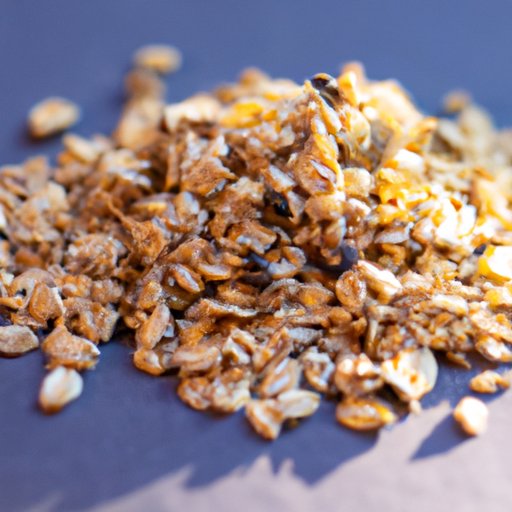
Introduction
When it comes to maintaining a healthy digestive system, fiber is one of the most important nutrients you need. In fact, fiber is often referred to as the ‘broomstick’ of the body since it sweeps through your digestive system, clearing out toxins and waste. However, most people are not getting enough fiber in their diets, which can lead to a number of health problems down the line. In this article, we’ll explore how much fiber you really need, the best sources of fiber, and how to incorporate more of this vital nutrient into your daily meals and snacks.
Top 10 Fiber-Rich Foods and How Much You Need Daily
Fiber is important for overall health as it can help to reduce your risk of developing a variety of health conditions. This includes heart disease, diabetes, and cancer, among others. Some of the best sources of dietary fiber include:
- Beans and legumes such as lentils, chickpeas, and black beans
- Wholegrain bread and cereals
- Fruits such as apples, pears, and berries
- Veggies such as carrots, broccoli, and sweet potatoes
- Nuts and seeds such as almonds and chia seeds
So how much fiber should you be aiming to consume each day? For adult men, the recommended daily intake is around 38 grams, while for adult women, it’s roughly 25 grams. However, keep in mind that this amount can vary depending on your age, gender, and level of physical activity. Athletes, for example, may require more fiber to support their active lifestyle.
Fiber: The Body’s Broomstick and How to Sweep Your Digestive System Clean
Think of fiber as the broomstick that helps to sweep your digestive system of debris and waste. Fiber helps to speed up the movement of food through your digestive tract, which can help to prevent constipation and keep your bowel movements regular. In addition, fiber can help to lower cholesterol and blood sugar levels, which can reduce your risk of developing heart disease and diabetes.
So how can you incorporate more fiber into your diet? Firstly, try to eat more wholegrain bread and cereals, as well as more fruits and veggies. You can also snack on nuts and seeds throughout the day, and add beans and legumes to your soups and stews. Finally, consider taking a fiber supplement if you’re struggling to get enough fiber through your diet alone.
Why You Need More Fiber Than You Think
Many people assume that they’re getting enough fiber, but the reality is that most of us fall short of our daily recommended intake. In addition, there are many lesser-known benefits of fiber intake that you may not be aware of. For instance, fiber can help to improve your skin’s health and appearance, as well as help to keep your immune system strong.
If you’re struggling to get enough fiber, there are a number of ways to increase your daily intake. For example, try replacing your regular pasta or rice with a wholegrain version. Alternatively, try snacking on whole fruits and veggies instead of high-fat, high-sugar snacks. Finally, consider incorporating more beans and legumes into your meals, since these are among the best sources of fiber out there.
Fiber for Different Lifestyles: How Much Do You Really Need?
How much fiber you need can depend on a variety of factors, including your gender, age, and lifestyle. Athletes, for example, may need more fiber to support their high level of physical activity. Women who are pregnant also need more fiber to support their changing bodies. Here’s a breakdown of how much fiber you should aim to consume each day based on your lifestyle:
- Adult men and women: around 25-38 grams per day
- Pregnant women: around 28 grams per day
- Athletes: anywhere from 30-50 grams per day
To meet your daily fiber needs, try to eat a variety of fiber-rich foods throughout the day. This can include everything from fruits and veggies to beans and legumes. You can also consider taking a fiber supplement if you’re struggling to get enough from your diet alone.
Fiber: The Key to Feeling Full and Avoiding Overeating
Fiber is also important for promoting satiety, which means it can help you to feel full for longer periods of time. This can be helpful for preventing overeating and for maintaining a healthy weight. Foods that are rich in fiber tend to be more filling and satisfying than low-fiber options, which can make it easier to stick to a healthy diet.
So how can you incorporate more fiber into your meals and snacks? Try to start your day with a fiber-rich breakfast, such as wholegrain cereal or oatmeal. You can also add fiber to your smoothies with ingredients like chia seeds or flaxseeds. Finally, aim to make half of your plate at lunch and dinner vegetables, as these are some of the best sources of dietary fiber.
Conclusion
In short, fiber is a critical nutrient that plays a key role in promoting digestive health and overall well-being. To ensure that you’re getting enough fiber each day, try to incorporate a range of fiber-rich foods into your meals and snacks. If you’re struggling to meet your daily fiber needs, a fiber supplement may be a helpful addition to your routine. With the right tools and knowledge, you can maintain a healthy digestive system and enjoy all the benefits that come with it.




